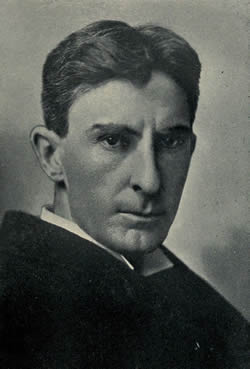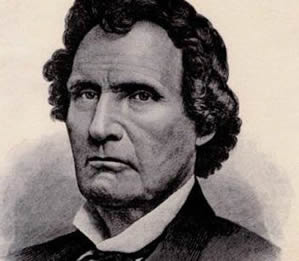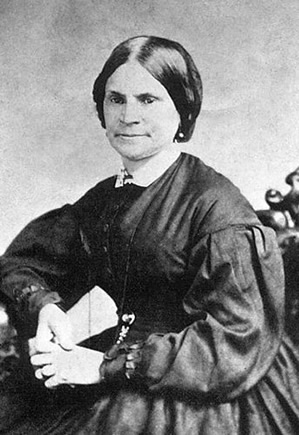Thomas Dixon Jr. (1864-1946)
and The Clansman
 Birth
of a Nation was based on Thomas Dixon Jr's. (1864-1946) 1905 novel, The
Clansman (1905). Dixon (pictured on the left) was an ordained Baptist minister, a North Carolina state legislator, and a writer.
Birth
of a Nation was based on Thomas Dixon Jr's. (1864-1946) 1905 novel, The
Clansman (1905). Dixon (pictured on the left) was an ordained Baptist minister, a North Carolina state legislator, and a writer.
The Clansman was part of a trilogy of novels about the Klan. In it Dixon argues for racial purity, and the sanctity of family, as well as against socialism. It's still in print.
Dixon's (and Griffith's) greatest fear was miscegenation (mixing of blacks and whites). For them, whites were whites, blacks were blacks. Whites were clearly superior. The world would be happy if both understood their place and stayed in it.
The real villain of Birth of a Nation is Stoneman's Lieutenant Governor, Silas Lynch. A second evil character (who we did not see in class) is Stoneman's housekeeper Lydia. both Lydia and Lynch are biracial. Lydia is based on Lydia Hamilton Smith (1813-1884), a biracial woman who was the common law wife of Thaddeus Stevens (1792-1868), the Pennsylvania legislator, fierce opponent of slavery and advocate for equality on whom Stoneman is based. You can see pictures of Stevens and Smith at the bottom of this page.
Griffith's film was racist, Dixon's book almost unbelievably so. Here's a fairly typical excerpt:
Austin Stoneman conversing with "the kindly" Doctor Cameron:
[Cameron:]"For a Russian to rule a Pole," he went on, "a Turk to rule a Greek, or an Austrian to dominate an Italian, is hard enough, but for a thick-lipped, flat-nosed, spindle shanked negro, exuding his nauseating animal odour, to shout in derision over the hearths and homes of white men and women is an atrocity too monstrous for belief. Our people are yet dazed by its horror. My God! when they realise its meaning, whose arm will be strong enough to hold them?"
"I should think the South was sufficiently amused with resistance to authority," interrupted Stoneman.
[Cameron:]"Even so. Yet there is a moral force at the bottom of every living race of men. The sense of right, the feeling of racial destiny - these are unconquered and unconquerable forces. Every man in South Carolina to-day is glad that slavery is dead. The war was not too great a price for us to pay for the lifting of its curse. And now to ask a Southerner to be the slave of a slave - "
"And yet, Doctor," said Stoneman, coolly, "manhood suffrage is the one eternal thing fixed in the nature of Democracy. It is inevitable."
[Cameron:]"At the price of racial life? Never!" said the Southerner, with fiery emphasis. "This Republic is great, not by reason of the amount of dirt we possess, the size of our census roll, or our voting register - we are great because of the genius of the race of pioneer white freemen who settled this continent, dared the might of kings, and made a wilderness the home of Freedom. Our future depends on the purity of this racial stock. The grant of the ballot to these millions of semi-savages and the riot of debauchery which has followed are crimes against human progress."
(Dixon, The Clansman, Pages 290-291)
Notice that Dixon, in Cameron's voice asserts (absurdly) that white Southerners are glad that slavery is over and believe that the Civil War was a fair price to pay for that outcome. Dixon and Griffith have a difficult job: support the US of their day and particularly support Lincoln, who by that time was an unquestioned culture hero, while at the same time claiming that racism and in particular, white supremacy was fundamental to the nation. Additionally, Dixon was a Republican (recall that Lincoln was as well), a prominent supporter of Theodore Roosevelt. The way both Dixon and Griffith accomplish this is by imagining that somehow most southerners never lost faith in Lincoln as their president and protector and that southerners had always favored the ending of slavery while at the same time insisting that whites were superior to and had more citizenship rights than others. The result of Dixon's and Griffith's labors was a garbeling of history that persists to the present.
Thaddeus Stevens

Lydia Hamilton Smith

Next: Read about Black Protest over Birth of a Nation.